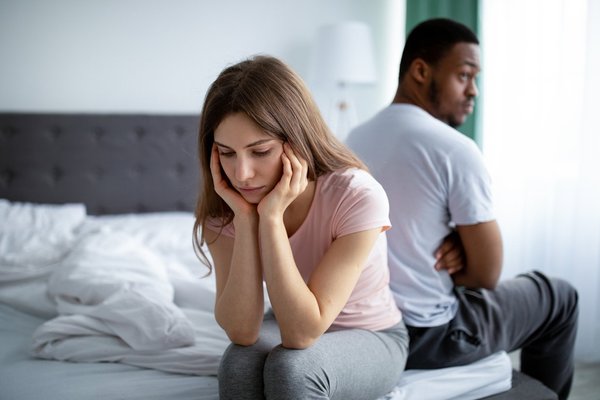If you've been through menopause, then you might say that your sex life has never been better. After all, the pregnancy worries are gone and so are the children. You can be spontaneous! Have sex in any room of the house!
You're no longer running your kids to endless activities, so you have more energy at the end of the day. You're relaxed and comfortable with who you are and what you want.
Right?
Hold up. For every woman in the throes of postmenopausal sexual bliss, there's a woman (or two or three) out there who quivers at the mere mention of sex. Or, she may have the desire—but not the ability. Sexual dysfunction affects millions of women in the United States.
Face it, a woman's sex drive is quite complex. Aside from the emotional aspects, there are physical changes during menopause that can, well, complicate things.
Take those extra pounds and the altered body shape that come with them (hello, belly fat!). A woman may feel uncomfortable or self-conscious about her body—and may barely recognize it as her own.
Poor self-image aside, if you're carrying extra weight, physical problems like reduced energy or reduced mobility may interfere with your sexual function.
And what of those momentous hormonal changes that go hand-in-hand with menopause? While your body is busy ushering your estrogen out, it's welcoming in some pretty significant vaginal changes, like dryness and thinning of its lining (otherwise known as vaginal atrophy). Less estrogen equals less vaginal lubrication, leading to a less elastic vagina. What ensues? Pain, burning, tightness or soreness. In fact, according to the North American Menopause Society, vaginal atrophy is the most common cause of painful sex at midlife and beyond.
Other possible sex-busters: hot flashes, mood swings, night sweats, irregular bleeding, sleep problems and insomnia. Those usual suspects of menopause.
So, what's a menopausal woman to do? First, remember that sexual problems are not problems if they're not bothersome to you or your partner. Everyone has their own "normal" and their own threshold for letting a problem get in the way of their relationship (or not).
Before you throw up your hands in despair (or throw out your lacy lingerie), here are some ideas worth considering:
- Physical therapy for pelvic discomfort
- Kegal exercises
- Regular sexual activity, which promotes vaginal health and blood flow. To make it easier, you may want to consider:
- Vaginal dilators
- Over-the-counter vaginal lubricants (for temporary relief of dryness before and during sex)
- Over-the-counter vaginal moisturizers (for longer-term relief from dryness)
- Low-dose vaginal estrogen therapy in cream, ring or vaginal tablet form (reverses underlying atrophy and dryness)
- Higher-dose hormone therapy throughout the body via pills, patches and other preparations (reverses underlying atrophy and dryness, but generally reserved for women with bothersome hot flashes. A recent Australian study published in the New England Journal of Medicine found that a testosterone patch may significantly improve a woman's sexual satisfaction. The patch is currently available in Europe to treat loss of sexual desire in women, but it is associated with a possible increase in the risk of breast cancer. More research is needed before the U.S. Food and Drug Administration (FDA) would approve the therapy.
Other treatments:
- Laser therapy. A new non-hormonal therapy, the MonaLisa Touch is a fractional carbon dioxide (CO2) laser specially designed to help restore vaginal health in postmenopausal women. It was recently introduced in this country after successfully treating more than 15,000 patients around the world. Performed by an OB/GYN, it works by delivering controlled energy to the vaginal tissue to revitalize the cells to make more collagen (which is an essential ingredient in vaginal cell health) and is an in-office, virtually pain-free procedure requiring no anesthesia.
- Flibanserin. Touted as the "female Viagra," the FDA twice rejected this drug, citing safety concerns like low blood pressure, dizziness and fainting. As of this writing, an FDA advisory panel has recommended approval of the drug on the condition that the drug's manufacturer, Sprout Pharmaceuticals, try to reduce the risks of side effects. Stay tuned for a final decision, possibly in summer 2015.
- Ospemifene (Osphena). This drug was approved by the FDA in 2013 for postmenopausal women who experience pain or discomfort during sexual intercourse. The once-a-day pill, which works by acting like estrogen in some parts of the body, helps make vaginal tissue thicker and less fragile.
Any woman considering taking any medication should have a thorough discussion with her health care provider to consider the risks and benefits.
- 9 Ways Menopause Can Give Your Sex Drive a Boost ›
- How to Have the Best Sex of Your Life After Menopause ›
- Yes, There Is Sex After Menopause - HealthyWomen ›
- Ignorance Isn’t Bliss When It Comes to Sex in Menopause - HealthyWomen ›
- Menopause and Sex - HealthyWomen ›
- Maintaining a Strong Sexual Connection During Midlife - HealthyWomen ›
- Yes, You Do Need Sex at Every Age - HealthyWomen ›







